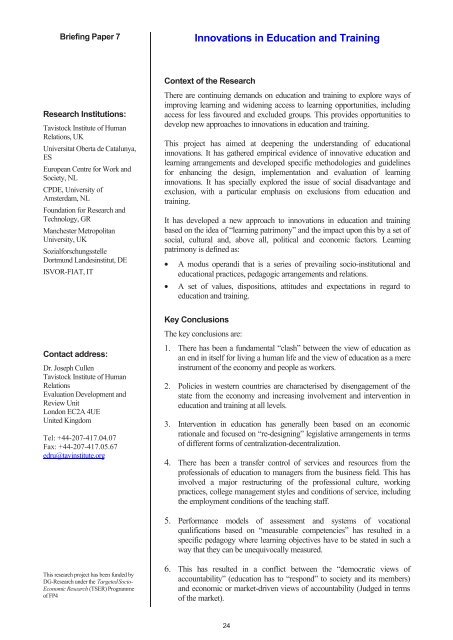briefing papers for policy makers
briefing papers for policy makers
briefing papers for policy makers
Create successful ePaper yourself
Turn your PDF publications into a flip-book with our unique Google optimized e-Paper software.
Briefing Paper 7<br />
Research Institutions:<br />
Tavistock Institute of Human<br />
Relations, UK<br />
Universitat Oberta de Catalunya,<br />
ES<br />
European Centre <strong>for</strong> Work and<br />
Society, NL<br />
CPDE, University of<br />
Amsterdam, NL<br />
Foundation <strong>for</strong> Research and<br />
Technology, GR<br />
Manchester Metropolitan<br />
University, UK<br />
Sozial<strong>for</strong>schungsstelle<br />
Dortmund Landesinstitut, DE<br />
ISVOR-FIAT, IT<br />
Contact address:<br />
Dr. Joseph Cullen<br />
Tavistock Institute of Human<br />
Relations<br />
Evaluation Development and<br />
Review Unit<br />
London EC2A 4UE<br />
United Kingdom<br />
Tel: +44-207-417.04.07<br />
Fax: +44-207-417.05.67<br />
edru@tavinstitute.org<br />
This research project has been funded by<br />
DG-Research under the Targeted Socio-<br />
Economic Research (TSER) Programme<br />
of FP4<br />
Innovations in Education and Training<br />
Context of the Research<br />
There are continuing demands on education and training to explore ways of<br />
improving learning and widening access to learning opportunities, including<br />
access <strong>for</strong> less favoured and excluded groups. This provides opportunities to<br />
develop new approaches to innovations in education and training.<br />
This project has aimed at deepening the understanding of educational<br />
innovations. It has gathered empirical evidence of innovative education and<br />
learning arrangements and developed specific methodologies and guidelines<br />
<strong>for</strong> enhancing the design, implementation and evaluation of learning<br />
innovations. It has specially explored the issue of social disadvantage and<br />
exclusion, with a particular emphasis on exclusions from education and<br />
training.<br />
It has developed a new approach to innovations in education and training<br />
based on the idea of “learning patrimony” and the impact upon this by a set of<br />
social, cultural and, above all, political and economic factors. Learning<br />
patrimony is defined as:<br />
• A modus operandi that is a series of prevailing socio-institutional and<br />
educational practices, pedagogic arrangements and relations.<br />
• A set of values, dispositions, attitudes and expectations in regard to<br />
education and training.<br />
Key Conclusions<br />
The key conclusions are:<br />
1. There has been a fundamental “clash” between the view of education as<br />
an end in itself <strong>for</strong> living a human life and the view of education as a mere<br />
instrument of the economy and people as workers.<br />
2. Policies in western countries are characterised by disengagement of the<br />
state from the economy and increasing involvement and intervention in<br />
education and training at all levels.<br />
3. Intervention in education has generally been based on an economic<br />
rationale and focused on “re-designing” legislative arrangements in terms<br />
of different <strong>for</strong>ms of centralization-decentralization.<br />
4. There has been a transfer control of services and resources from the<br />
professionals of education to managers from the business field. This has<br />
involved a major restructuring of the professional culture, working<br />
practices, college management styles and conditions of service, including<br />
the employment conditions of the teaching staff.<br />
5. Per<strong>for</strong>mance models of assessment and systems of vocational<br />
qualifications based on “measurable competencies” has resulted in a<br />
specific pedagogy where learning objectives have to be stated in such a<br />
way that they can be unequivocally measured.<br />
6. This has resulted in a conflict between the “democratic views of<br />
accountability” (education has to “respond” to society and its members)<br />
and economic or market-driven views of accountability (Judged in terms<br />
of the market).<br />
24


